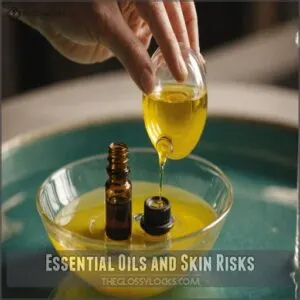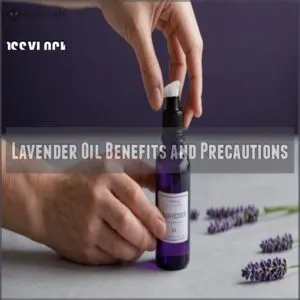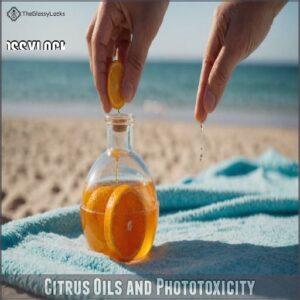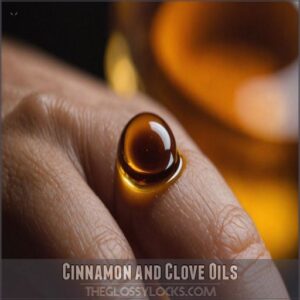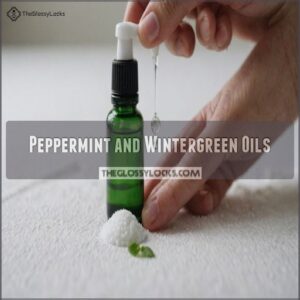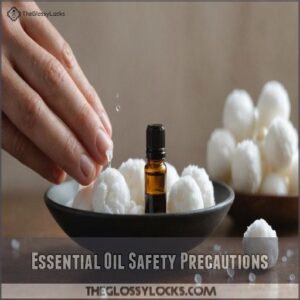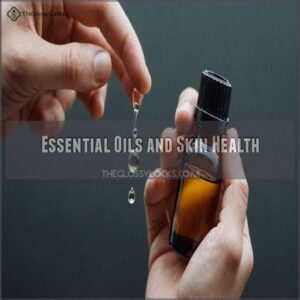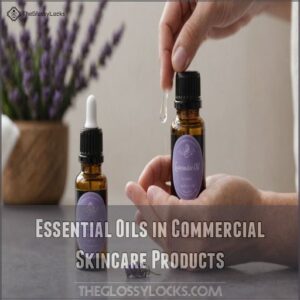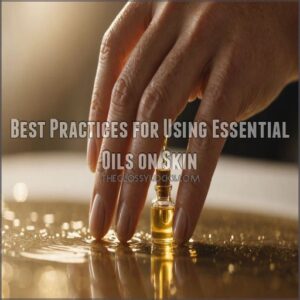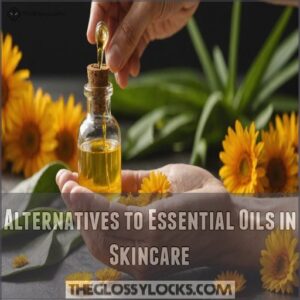This site is supported by our readers. We may earn a commission, at no cost to you, if you purchase through links.
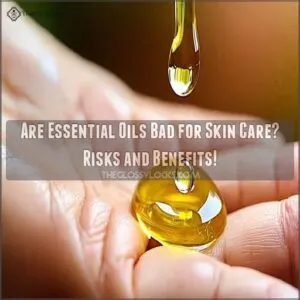 If you’ve ever wondered, "are essential oils bad for skin care?" it’s not a straight yes or no.
If you’ve ever wondered, "are essential oils bad for skin care?" it’s not a straight yes or no.
While essential oils can offer benefits like hydration and anti-aging properties, they can also irritate sensitive skin.
Some oils, like citrus, are phototoxic and make your skin more sensitive to sunlight, while lavender and tea tree might be safe if diluted properly.
Knowing your skin type and patch testing is key to avoiding unpleasant surprises.
It’s like inviting a new friend over; you wouldn’t skip the coffee chat first.
Explore more ways to harness essential oils safely in upcoming sections.
Table Of Contents
- Key Takeaways
- Essential Oils and Skin Risks
- Safe Essential Oils for Skin Application
- Fragrant Oils to Avoid in Skincare
- Essential Oil Safety Precautions
- Essential Oils and Skin Health
- Essential Oils in Commercial Skincare Products
- Best Practices for Using Essential Oils on Skin
- Alternatives to Essential Oils in Skincare
- Frequently Asked Questions (FAQs)
- Are essential oils bad for your skin?
- Are essential oils safe to use on your face?
- Are essential oils dangerous?
- Do essential oils make a rash worse?
- What are Essential Oils?
- How can Essential Oils Hurt Skin?
- What are the best essential oils for skin?
- What Fragrant Oils Should I Avoid?
- What should I use instead of essential oils?
- Are essential oils bad in skincare?
- What essential oils are safe on skin?
- Can essential oils cause skin problems?
- Do essential oils cause hyperpigmentation?
- Can essential oils clog pores?
- Do essential oils cause breakouts?
- Which oils are good for sensitive skin?
- How to use essential oils for anti-aging?
- Are essential oils good for eczema?
- Conclusion
Key Takeaways
- While essential oils can benefit your skin through hydration and anti-aging properties, they aren’t universally safe – you’ll need to patch test and properly dilute them to avoid irritation.
- You should be especially cautious with citrus oils as they’re phototoxic, making your skin more sensitive to sunlight and potentially causing burns or reactions.
- Your skin type matters – what works for someone else might not work for you, so you’ll want to consult a dermatologist or aromatherapist before incorporating essential oils into your skincare routine.
- If you’re concerned about reactions, you’ve got alternatives – natural carrier oils, butters, and plant extracts can offer similar benefits with less risk of irritation.
Essential Oils and Skin Risks
When you think about essential oils for skin care, remember they aren’t always as gentle as they smell.
Skin irritation, allergic reactions, and phototoxicity are real risks that can cause more trouble than a pesky pimple.
Skin Irritation and Sensitivity
Essential oils can sometimes irritate your skin, particularly if you’re sensitive.
They’re like spicy food—not for everyone!
Always dilute with a carrier oil before slathering it on.
Try a patch test first; it’s like testing a new dance move in your room.
When using essential oils in your skincare routine, it’s crucial to dilute them with carrier oils like jojoba or coconut oil, as outlined in this natural skincare routine diy. Incorporate these precautions into your skincare routine to keep your skin happy and healthy.
Allergic Reactions and Symptoms
You might think your skin is invincible, but essential oil allergy triggers can sneak up on anyone.
Common allergy symptoms include contact dermatitis leading to a skin rash, and it’s also worth noting that improper use of essential oils can exacerbate issues like under-eye puffiness relief.
Respiratory issues like sneezing, itchy or watery eyes, and nasal congestion.
These reactions can turn your favorite fragrance into an unexpected ordeal.
Phototoxicity and Sun Sensitivity
Sun sensitivity isn’t just about forgetting sunscreen.
Some essential oils can turn you into a sun magnet!
Photosensitizing oils like citrus can cause serious skin reactions under UV exposure.
| Oil Type | Risk Factor | Use Caution With |
|---|---|---|
| Citrus | High | Sun exposure |
| Bergamot | Medium | Outdoor activities |
| Lemon | High | Daytime applications |
Before basking outdoors, check if your oil loves the sun more than you do!
Safe Essential Oils for Skin Application
When choosing essential oils for skin application, it’s important to pick those with a track record of safety and effectiveness, like tea tree, lavender, and chamomile oils.
These oils offer various benefits, but make sure you know the precautions to take for each to keep your skin happy and healthy.
Tea Tree Oil Benefits and Precautions
That bottle of tea tree oil? It’s a powerhouse for your skin!
Many swear by tea tree oil for acne, thanks to its antibacterial properties, which can also help reduce inflammation and potentially minimize acne scar formation.
It also helps fight fungus, making it a great choice for certain skin conditions.
However, always dilute tea tree oil for skin application—a general guideline is 1% concentration.
Some folks have tea tree oil allergies, so a patch test is very important before applying it liberally.
Remember, safety first!
Lavender Oil Benefits and Precautions
Lavender oil, beyond smelling like a field of calm, can be your skin’s best buddy—or sometimes not.
It can help with minor skin irritations, serving as a gentle aid.
However, use it wisely to avoid any surprises.
- Promotes: Helps with relaxation and sleep aid.
- Supports: May encourage hair growth.
- Cautions: Perform a patch test to prevent reactions.
Chamomile Oil Benefits and Precautions
Chamomile oil is like nature’s gentle hug for your skin.
Known for its anti-inflammatory magic, it helps soothe eczema and acne.
Imagine the calming effect of chamomile tea, but on your face!
Plus, it works wonders for anxiety relief and aids sleep.
This multitasker even boosts hair health.
Just remember, test before committing—your skin will thank you!
Fragrant Oils to Avoid in Skincare
In the world of skincare, some fragrant oils might do more harm than good, so it’s wise to approach them with caution.
Fragrant oils like citrus, cinnamon, and peppermint can irritate your skin or even cause sun sensitivities, making them better suited for the spice cabinet than your skincare routine.
Citrus Oils and Phototoxicity
Citrus oils might sound perfect for a fresh skincare routine, but beware of phototoxicity risks.
These zesty oils can make your skin extra sensitive to the sun, causing burns faster than you can say "sunkissed."
To stay safe, slather on sunscreen if you’ve used citrus oils.
Consider safe alternatives like rose or chamomile oil for non-sun-sensitive glow.
Cinnamon and Clove Oils
Thinking of adding cinnamon or clove oils to your skincare routine? Think twice! These potent oils can ignite skin sensitivity like a firecracker. They’ve anti-inflammatory and antimicrobial benefits but can irritate when misused.
Here’s a quick checklist to guide you:
- Avoid direct application
- Steer clear of DIY recipes
- Beware of oral use
- Dilute effectively
- Patch test persistently
Peppermint and Wintergreen Oils
You might think peppermint and wintergreen oils are invigorating, but using them on your skin can be risky.
These oils may cause irritation or allergic reactions, especially when not diluted properly.
A safe dilution ratio makes sure you’re not overexposing your skin.
Always patch test before application, and remember, what’s invigorating in mint gum isn’t always great for your face!
Essential Oil Safety Precautions
Before you start using essential oils on your skin, remember safety first!
Always perform a patch test to check for reactions.
Always dilute your essential oils with a carrier oil before applying them to larger areas of your skin.
Patch Testing and Dilution
That fresh citrus scent might be tempting, but before rubbing essential oils on your skin, consider patch testing and dilution.
Test drops on your forearm for 24 hours.
Use a carrier oil to dilute, ensuring safety while factoring in skin sensitivity.
This simple step keeps you free from unexpected reactions.
Nobody wants a rash as a surprise party favor!
Carrier Oils and Ratios
Choosing the right carrier oils often makes all the difference in essential oil safety. Here’s a quick run-down:
- Carrier oil types: Jojoba, almond, or coconut are reliable choices.
- Dilution guidelines: Stick to 2-3 drops of essential oil per teaspoon of carrier oil.
- Safe ratios: Aim for a 5% essential oil concentration.
- Carrier oil properties: Consider scent neutrality and skin absorption.
Handling Adverse Reactions
Ever found yourself in a pickle after using essential oils?
Spot skin reactions like redness or irritation by doing a patch test first.
If things go south despite your best effort, remember: safe oils and proper dilution ratios are your friends.
If an allergic response kicks in, stop use and reach out to a healthcare pro pronto.
Safety first!
Essential Oils and Skin Health
For skin health, essential oils offer a range of benefits, like hydration and anti-aging properties, that can enhance your skincare routine.
However, it’s essential to use them correctly to avoid potential issues, such as disrupting your skin barrier, leading to irritation or sensitivity.
Hydration and Moisture Benefits
Amid your search for dry skin solutions, essential oils might just sneak in as the secret ingredient.
They’ve got those oil-based hydration benefits, acting like tiny moisture.
Using a best carrier oil for dry skin.
Essential oils help lock in moisture, offering skin barrier support that feels like a snug blanket for your skin.
Just make sure to dilute to keep things safe and sound!
Anti-Aging Properties and Benefits
After quenching your skin’s thirst, with products like Dr. Denese SkinScience’s Essential Lipid Anti-Aging Power Infusion Dry Oil that rebuilds the lipid barrier, let’s stroll into the anti-aging perks of essential oils.
They play a sly game of wrinkle reduction, boosting skin elasticity like a gentle workout for your face.
With collagen stimulation and antioxidant benefits, these oils act like a time machine, but don’t expect miracles.
Pick wisely, and consult a pro for that youthful glow.
Skin Barrier Function and Essential Oils
So, we’ve talked about how some oils fight wrinkles.
Now, let’s look at how they affect your skin’s protective layer, the skin barrier.
A healthy skin barrier keeps irritants out and moisture in.
Some oils can strengthen it, while others might weaken it, depending on the oil and your skin type.
It’s all about finding the right fit for you.
Always patch test before applying anything new.
Essential Oils in Commercial Skincare Products
You might notice essential oils like lavender and tea tree listed in the ingredients of your favorite skincare products, but it’s important to understand the concentrations and regulatory standards they adhere to.
Knowing what’s behind those labels helps you make informed choices about potential benefits and risks to your skin.
Label Claims and Ingredient Lists
You might sometimes find yourself puzzled by skincare labels. They often boast ingredient transparency but mix in a dash of marketing hype. Make sure label accuracy by scrutinizing ingredient lists and checking for ethical sourcing.
- Ingredient transparency: Trust comes from clear labels.
- Marketing hype: Be wary of exaggerated claims.
- Label accuracy: Verify contents with trusted sources.
- Ethical sourcing: Support brands with responsible practices.
Concentrations and Potencies
Essential oils in skincare products vary greatly in concentration and potency, just as hair growth serums with nutrient-rich oils can have varying effects on hair health. Essential oils in skincare products vary greatly in concentration and potency.
Imagine a concert where some notes are louder; that’s how potency can vary.
Understanding safe essential oil dilution ratios is very important for achieving the right balance.
Dilution ratios make sure you get benefits without risking irritation.
Skincare relies on safe dilution practices and knowing how different concentrations impact skin health.
Keep potency in check, balancing benefits and safety like seasoned chefs with seasoning.
Regulation and Safety Standards
You’ve waded through concentrations and potencies, now let’s chat about keeping your skin safe.
Industry regulations and certification programs aim to protect consumers.
For example, check out this review of cleansing wipes to see how essential oils are incorporated into commercial skincare products.
Here’s the skinny:
- Regulatory bodies guarantee essential oils in skincare meet labeling requirements.
- Certification programs promise certain quality standards.
- These systems help keep dodgy products off shelves, giving you peace of mind as you pamper your skin.
Best Practices for Using Essential Oils on Skin
When using essential oils on your skin, it’s important to tailor their application to your specific skin type and health needs.
Consulting a dermatologist or aromatherapist can help make sure you’re using them safely and effectively, much like consulting a GPS before a trip to avoid getting lost.
Proper Application and Usage
Once you understand the basics of labels, the real magic happens when you pamper your skin.
Imagine this: a tiny bottle, yet a powerhouse! Dilute essential oils with carrier oils for safe topical application.
Test first with patch testing—no surprises. Even if your skin throws a tantrum, reel it back with less.
Safety and peace of mind, just a drop away!
Skin Type and Essential Oil Selection
Knowing your skin type is key.
Oily skin might benefit from tea tree oil’s clarifying properties, while dry skin could appreciate the moisturizing effects of lavender.
For sensitive skin, consider using products specifically formulated with gentle oils like chamomile oil for sensitive skin.
Sensitive skin can greatly benefit from gentle chemical exfoliants like alpha-hydroxy acids that help rejuvenate without causing irritation. Sensitive skin needs gentle oils like chamomile.
Combination skin requires a balanced approach, and mature skin may find benefits in certain oils’ anti-aging properties.
Always start with a patch test before applying to your entire face.
Consulting With a Dermatologist or Aromatherapist
Imagine your skincare routine as a recipe.
Consulting a dermatologist or aromatherapist is like checking with a chef to get the flavor just right.
They can help steer clear of essential oil allergies and make sure pregnancy safety is a priority.
Discuss safe dilution practices and get product recommendations that suit your needs.
This expert advice keeps your skin happy and healthy!
Alternatives to Essential Oils in Skincare
You might be wondering if there are safer options to essential oils in skincare, and there certainly are.
From plant extracts and herbal remedies to natural oils and butters, there’s a variety of alternatives that can offer similar benefits without the potential irritation.
Plant Extracts and Herbal Remedies
If you’re curious about skincare’s natural side, bakuchiol, a plant-based alternative to retinol, is gaining popularity for its soothing and healing benefits, offering similar anti-aging benefits without irritation in products like gentle retinol alternatives. Plant extracts and herbal remedies might pique your interest.
Their plant origins offer a rich herbal history that fascinates many.
Here are some points to keep in mind:
- Extraction Methods: Cold-pressing or distillation can impact effectiveness.
- Dosage Concerns: Too much? You risk irritation.
- Regulatory Oversight: Unlike essential oils, stricter guidelines maintain safety.
Synthetic Fragrances and Preservatives
While plant extracts offer a natural touch, synthetic fragrances might tell a different story.
These concoctions often mask what you’re really putting on your skin.
If you’re looking for products without fragrance, check out this website for fragrance-free skincare options.
Some preservatives keep products fresh, but they also stir worries about health implications.
Look for ingredient transparency—know what you’re using.
Remember, natural vs. synthetic isn’t about good or bad, it’s understanding the trade-offs.
Natural Oils and Butters
Switch from essential oils, which can be potent for hair growth when used correctly, such as in hair growth oil recipes with essential oils, to natural oils and butters for a gentler touch on your skin.
These alternatives, like coconut oil and shea butter, hydrate deeply without surprise reactions.
Learn oil blending tips for DIY skincare recipes that soothe your senses.
Compare butter vs. oil benefits, adjusting your treatment for freedom from irritation while indulging your skin’s needs.
Frequently Asked Questions (FAQs)
Are essential oils bad for your skin?
Essential oils aren’t inherently bad for your skin, but they can cause irritation if used undiluted.
Always do a patch test and dilute them properly with a carrier oil to enjoy their benefits safely.
Are essential oils safe to use on your face?
You can use essential oils on your face, but dilute them first.
Undiluted oils might irritate the skin or cause allergic reactions.
Perform a patch test to check for reactions.
Always consult a dermatologist for specific advice.
Are essential oils dangerous?
Using essential oils can pose risks if not done correctly.
Adverse reactions, skin irritation, and hormonal imbalances are possible, especially for pregnant women, children, and pets.
This emphasizes the need for caution and guidance.
Do essential oils make a rash worse?
Having a rash? Essential oils might shake things up like a bull in a china shop.
They can sometimes irritate sensitive skin, making rashes worse.
Always patch test and dilute to keep your skin smiling.
What are Essential Oils?
Essential oils are concentrated plant extracts capturing the aroma and beneficial compounds of the source.
They are used in aromatherapy and skincare.
Their potency requires careful handling to avoid irritation or allergies.
Always dilute before applying to skin.
How can Essential Oils Hurt Skin?
Imagine applying undiluted lemon oil – ouch! Essential oils, highly concentrated, can cause irritation, allergic reactions, or even burns if not diluted properly. Always dilute and patch test before use.
What are the best essential oils for skin?
You might feel like a skincare wizard using essential oils.
Lavender and frankincense moisturize and soothe, while tea tree tackles blemishes.
Just remember to dilute them properly to keep your skin happy and irritation-free.
What Fragrant Oils Should I Avoid?
Avoid fragrant oils like cinnamon bark, clove, lemongrass, and peppermint on sensitive skin due to irritation risks.
They can be too harsh, potentially causing redness or allergic reactions.
Always patch test and consult an expert if unsure.
What should I use instead of essential oils?
Opt for plant-based oils like jojoba, argan, or grapeseed for skincare; they’re nourishing and less risky.
These oils naturally hydrate and protect your skin without the potential irritations or sensitivities essential oils might provoke.
Are essential oils bad in skincare?
While essential oils can be tempting as a natural option for skincare, they mightn’t always play nice with sensitive skin.
Some, especially citrus ones, can cause irritation or sun sensitivity, so patch test first.
What essential oils are safe on skin?
Lavender, tea tree, and chamomile oils can be safe on your skin when properly diluted.
Always perform a patch test first.
Remember, essential oils are potent, so less is more to keep your skin happy and healthy.
Can essential oils cause skin problems?
Ever wonder if essential oils can cause skin problems?
They can indeed cause irritation or allergic reactions if not diluted properly.
Some oils are phototoxic, leading to sun sensitivity.
Always patch test and dilute before use.
Do essential oils cause hyperpigmentation?
Some essential oils might worsen hyperpigmentation, especially citrus oils. Always do a patch test first! If you’re concerned, chat with a dermatologist before using them on your face.
Can essential oils clog pores?
Think of essential oils as tiny wizards; they won’t clog your pores, but their magic varies.
Some oils can irritate or dry skin if misused, so always dilute and patch test for skin harmony.
Do essential oils cause breakouts?
Essential oils might lead to breakouts if they’re not properly diluted or if you have sensitive skin.
Always patch test new oils and use non-comedogenic carriers to avoid clogging pores and causing acne flare-ups.
Which oils are good for sensitive skin?
Imagine your skin as a delicate flower needing gentle care.
Jojoba, rosehip, and chamomile oils work wonders for sensitive skin.
They soothe and hydrate without irritation, offering freedom from harsh chemicals while maintaining a natural glow.
How to use essential oils for anti-aging?
Use essential oils like rosehip or frankincense for anti-aging by blending a few drops with a carrier oil like jojoba.
Apply gently on your face at night.
Over time, they may help reduce wrinkles and improve elasticity.
Are essential oils good for eczema?
When dealing with eczema, essential oils like lavender or chamomile might help soothe irritation.
However, patch-test first to prevent reactions, and always dilute properly.
Consult a healthcare professional for personalized advice to make sure safety and effectiveness.
Conclusion
Did you know about 30% of people experience skin reactions to essential oils?
When considering if essential oils are bad for skin care, balance is key.
They can enhance your routine with benefits like hydration and anti-aging but pose risks like irritation and phototoxicity, especially for sensitive skin.
Always patch test and dilute oils before use.
To navigate safely, understanding your skin type and consulting a professional can help maximize benefits while minimizing risks.

